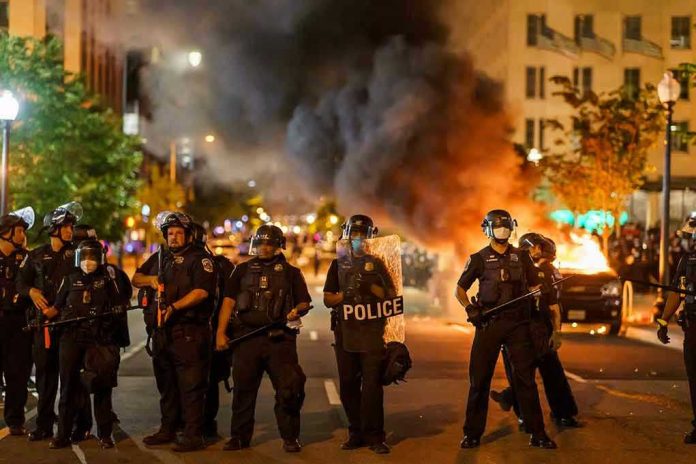
Madagascar’s president abandoned his nation and fled to an undisclosed location after military forces turned against him, choosing exile over bloodshed in a decision that leaves Africa’s fourth-largest island nation teetering on the edge of chaos.
Story Snapshot
- President fled Madagascar following military rebellion, citing credible threats to his life
- Rejected offers from African leaders to send troops, stating foreign military intervention contradicts Malagasy values
- Warned citizens that continued instability will plunge the already impoverished nation deeper into economic crisis
- Called for constitutional order to be maintained despite his absence from the country
- Military rebellion creates power vacuum in nation with history of coups and political upheaval
Flight Over Fight: President’s Calculated Retreat
The president’s October 14 announcement shocked the international community. Speaking from an undisclosed safe location, he explained that remaining in Madagascar would have cost him his life. This wasn’t hyperbole or cowardice; military factions had made their intentions clear. The president faced a stark choice: stay and potentially become a martyr, or leave and hope constitutional order could somehow survive his absence. He chose survival, but his departure raises uncomfortable questions about leadership during crisis and whether fleeing serves the people or abandons them to their fate.
The impeachment of Madagascar's president has now been followed by a military takeover. Elite military unit sets up a ruling committee. "Perhaps in time it will include senior civilian advisers," its commander says. https://t.co/YhNOB6swsM pic.twitter.com/GEXtwhxpLF
— Geoffrey York (@geoffreyyork) October 14, 2025
The Foreign Intervention Dilemma
African leaders immediately offered military assistance to restore order, a gesture that might seem noble on the surface. The president declined, and his reasoning deserves scrutiny. He argued that foreign troops on Malagasy soil would violate national values and dignity. There’s wisdom in this refusal. History shows that foreign military interventions in African nations often create more problems than they solve, establishing dependency relationships and sometimes never leaving. The president understood that inviting foreign armies would set a precedent undermining sovereignty. His decision reflects a principled stance that prioritizes long-term independence over short-term security, though critics might argue it leaves citizens vulnerable to military rule.
Madagascar’s Cycle of Military Interference
This crisis isn’t Madagascar’s first rodeo with military coups. The 2009 coup that ousted President Marc Ravalomanana, backed by military forces supporting then-mayor Andry Rajoelina, demonstrated how quickly democratic institutions can crumble when soldiers decide to play politics. That intervention triggered years of international isolation, economic sanctions, and suspended aid. The pattern repeats itself: political grievances fester, military factions exploit discontent, constitutional order collapses, and ordinary Malagasy people pay the price through poverty and instability. Breaking this cycle requires military forces that respect civilian authority, something Madagascar has struggled to achieve throughout its post-independence history.
The Constitutional Order Paradox
The president’s plea for constitutional respect creates an ironic situation. He asks citizens and military forces to honor constitutional processes while he himself has fled the country, potentially abandoning his constitutional duties. The constitution likely doesn’t include provisions for presidents governing from exile. This paradox highlights the fragility of democratic institutions when backed only by paper and tradition rather than genuine commitment from all stakeholders. Constitutional order requires everyone, especially those with guns, to agree that rules matter more than power. When military factions decide otherwise, constitutions become irrelevant regardless of presidential appeals from safe houses abroad.
The Power Vacuum and Regional Stability
Madagascar’s crisis doesn’t exist in isolation. Regional stability requires predictable governments and respected borders. When presidents flee and militaries rebel, neighboring nations watch nervously, wondering if instability might spread. The African Union and regional leaders offered assistance not purely from altruism but from calculated self-interest in maintaining regional order. Madagascar’s position as an island nation provides some insulation, but economic disruption, refugee flows, and the precedent of successful military rebellion concern the entire region. The international community must balance respecting sovereignty against preventing humanitarian catastrophe and regional destabilization.
What Happens Next Determines Everything
Madagascar stands at a crossroads. The military could consolidate power, install new leadership, and eventually transition back to civilian rule as happened after 2009. Alternatively, competing factions might fight for control, plunging the nation into prolonged conflict. International pressure and sanctions could force negotiations and compromise. Or the president might orchestrate a return backed by loyal forces. Each scenario carries risks and opportunities. The Malagasy people deserve leaders, whether civilian or military, who prioritize national welfare over personal ambition. They deserve institutions strong enough to withstand political storms. Most importantly, they deserve the stability necessary for economic development and human flourishing that decades of political chaos have denied them.
Sources:
Madagascar in Crisis: Gen Z Protests Force President Rajoelina to Flee



